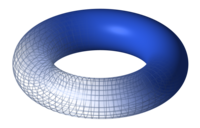Topology
Topology is the natural evolution of analysis to a more general level. Whereas analysis was concerned with the implications of continuity on the familiar spaces of Rn and Cn, topology seeks to explore all the types of mathematical structures where analytical concepts can be applied in some form. From the loose structure of point-set topology to the requirement that objects admit some type of smooth structure in differential topology, this division studies the implications of applying analysis to all the types of objects where it makes sense to define some sort of analytical structure. Note that while topology originally evolved from the study of partial differential equations by Poincaré, the modern student need only bring a knowledge of limits and continuity from a good calculus course with them, as well as a basic understanding of what a group is.

Course Goal
editThe goal of this course is to introduce and build proficiency with the basic machinery of modern topology using examples from an area of topology that is well understood, such as the topology of surfaces. The student will then be well-prepared to encounter the strangeness and pitfalls of more abstract and higher-dimensional topology.
Background
editLessons
editResources
editOffsite Learning Materials
edit- The Geometry Junkyard's Geometric (Surface) Topology Collection
- Topology Atlas
- Topology Without Tears an accessible introduction to the basics of topology.
- Journal of Geometry and Topology - By the end of this course, the student should be able to at the least read the simplest of these papers without their head exploding. ;-)
Courses
edit- An Introduction to Functional Analysis, by John Cagnol, Anna Rozanova-Pierrat, École Centrale Paris
- Introduction to Functional Analysis, Richard Melrose, Massachusetts Institute of Technology, Spring 2009.
- Math 109a: Introduction to Geometry and Topology, Alexander Gorodnik, IIT Guwahati, 2014 – 2015.
- Metric and Topological Spaces, John O'Connor, University of St Andrews, Scotland, 2004.
- MATH 4530 : Introduction to Topology , Tomoo Matsumura, Cornell University, Fall 2010.
- MATH 4181: Introduction to Topology, David C. Royster, University of Kentucky, Fall 1999.
- Math 429: Introduction to Topology, Aissa Wade, Penn State University, Fall 2005.
Ebooks
edit- Topology, Tai-Danae Bradley, Tyler Bryson, and John Terilla, MIT Press 2020. A graduate-level textbook that presents basic topology from the perspective of category theory.
Recommended Reading
editLike all other mathematics, topology can only be learned by doing it. While this site provides a supportive community of peers and teachers, you also need a well-organized and well-written text that you can study anywhere to learn from those actively participating in field.
- Kinsey, L. Christine. (2004). Topology of Surfaces Springer. ISBN 0387941029
- Munkres, James. (1999). Topology Prentice Hall. ISBN 0131816292